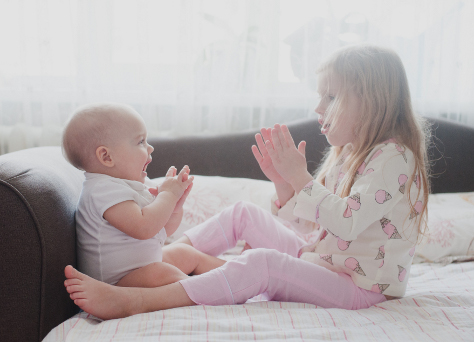Birth order: Does it affect your little one’s personality?
Where your baby is born in the family dynamics can impact their personality traits, we take a look at how

We’re all aware of those stereotypes about children and siblings. The ‘only child’ supposedly finds it hard to share, the eldest child tends to show signs of bossiness, everyone babies the baby, and the middle child is -- well, in the middle. These are very general stereotypes perhaps but is there any truth in these traits that are said to show as a result of where in the family you are born? We take a look.
Does birth order affect personality traits?
Not really is the answer. It’s more a result of the influence of siblings, or not having siblings that help mould these personality traits. For example, an only child doesn’t have the day to day learning experience of having to share their things. It’s theirs and that’s it, explaining why when they are expected to share with another child is just something they have less experience of at first.
Being the oldest
Same with the oldest child, they would have experienced a period of time being an only child and not having to share but by the time they do, they know how the toy works and find it confusing and frustrating when their younger sibling tries to do it wrong. It feels natural for the older, more experienced sibling to take charge and show how it’s done.
It’s natural for parents to trust the older child more so than the younger ones so they feel more respected by the parent and therefore delight in the confidence this gives them and have a need to prove they are worthy of it. They often display this by taking over with a younger child to show they can help and prove to the parent they know what to do.
Born in the middle
The middle child is often the one that gets labelled ‘middle child’ and will often show conflicting traits to their older sibling. This tends to be because they see the role as filled by their older sibling, which can quite often be the position of ‘parent pleaser.’ They can feel there is no room for them so may choose the opposite route of showing signs of rebellion as a way to get parents’ attention. The youngest child may be seen by the middle child as getting away with everything or being ‘babied’ by everyone so they can start to use negotiating skills to help them find their place. They are often more independent and can deal with disappointment fairly well.
Being the baby
The baby of the family is quite often ‘babied’ for longer than the other siblings as they are the last baby in the family – arguably some say this trait can carry on into adulthood! Being the youngest can see them shouldering less responsibility, more carefree and sociable than their older siblings and can subsequently show personality traits such as being easy going as they are more likely to be used to their older siblings making decisions. However being the youngest can see them being spoiled as everyone in the family may treat them as the baby and they get used to playing on this to get what they want.
The one and only
Only children can tend to resemble ‘little adults’ as quite simply they are more likely to spend more of their time with adults than other children. There is on occasions a risk of being somewhat self-centred as they don’t have the competition for their parents’ attention that children with siblings have. They are more used to be listened to and getting their own way so may find it tougher than children with siblings when things don’t go their way.